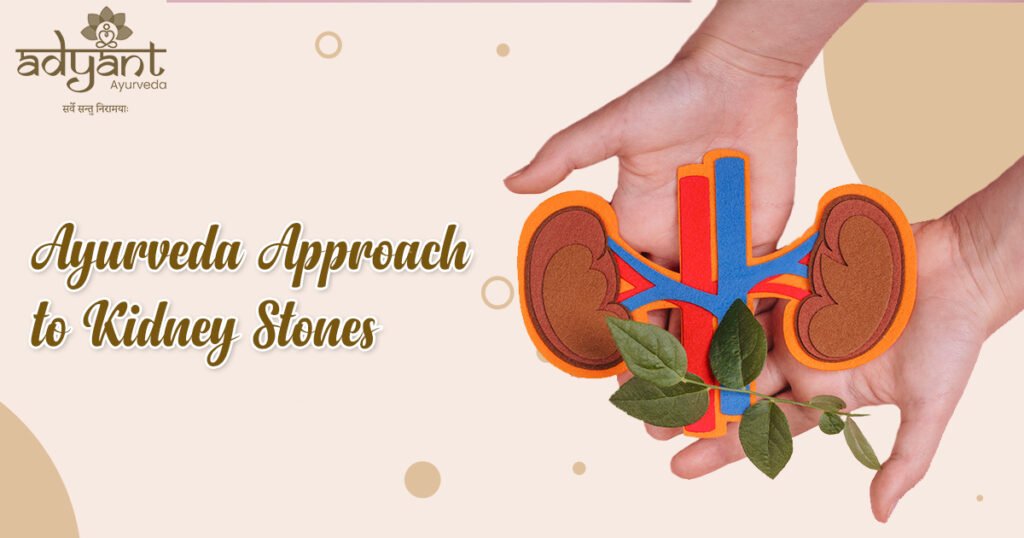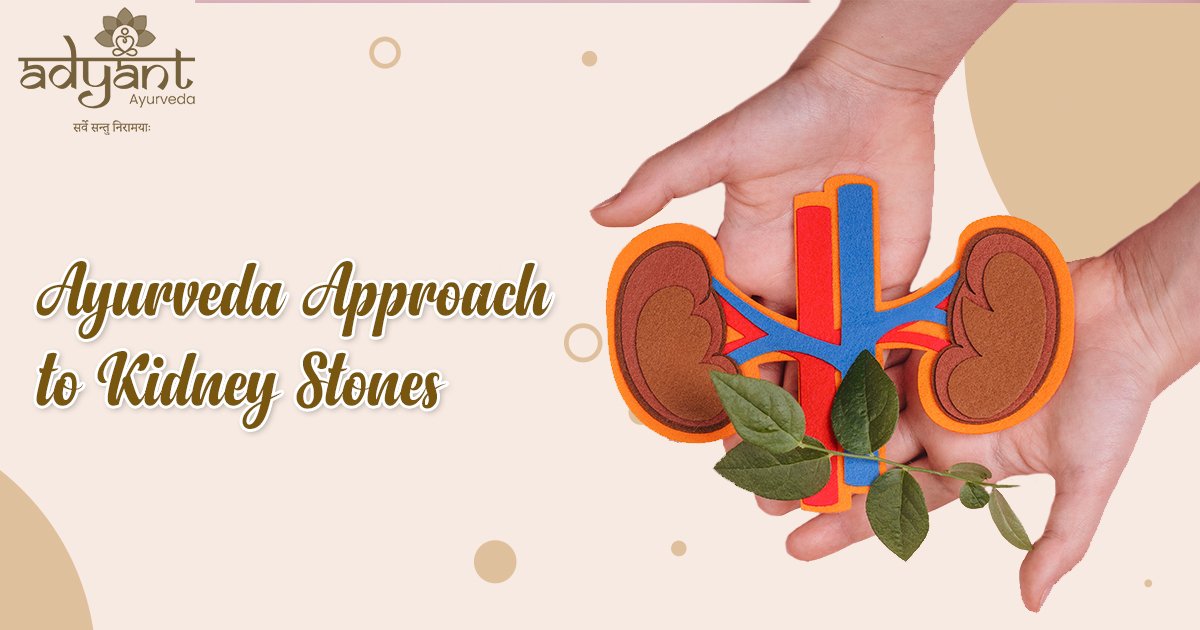
Kidney Stone Ayurvedic Treatment: Kidney stones, despite their small size, can cause significant pain and discomfort. Kidney stones, also known as Mutrashmari in Ayurveda, are hard mineral and salt deposits that form in the kidneys due to an imbalance in doshas, dehydration, and poor diet. They can cause severe pain, urinary obstruction, nausea, and infections if left untreated.
At Adyant Ayurveda, we offer a natural, holistic approach to treating kidney stones using time-tested Ayurvedic therapies, herbal formulations, and Panchakarma treatments. Recognized with the Excellence in Panchakarma Treatment Award by Times Health 2024 and the National AYUSH Award 2024, our team of BAMS doctors with 24+ years of experience specializes in safe and effective Ayurvedic solutions for kidney stone removal and prevention.
For a free consultation with top ayurvedic doctors for Kidney Stone Ayurvedic Treatment, download our app from Play Store “AyurCare“
What are Kidney Stones?
Kidney stones are hard, crystalline deposits formed in the kidneys due to the accumulation of minerals and salts in urine. Their size can vary from a grain of sand to as large as a golf ball.
Types of Kidney Stones:
- Calcium Oxalate Stones – The most common type, formed due to high oxalate levels in the urine.
- Struvite Stones – Often linked to urinary tract infections (UTIs).
- Uric Acid Stones – Formed due to excessive uric acid in the body, common in gout patients.
- Cystine Stones – A rare genetic disorder that leads to excessive cystine in the urine.
You May Also Like: Ayurvedic Treatment for UTI (Urinary Tract Infection)
Understanding Kidney Stones in Ayurveda (Mutrashmari)
According to Ayurveda, “kidney stones are caused by an imbalance of Vata, Pitta, and Kapha doshas, leading to the formation of crystal-like deposits in the urinary tract.”
- Vata Dosha Imbalance – Causes dryness, roughness, and stone formation due to improper digestion.
- Pitta Dosha Aggravation – Leads to a burning sensation, inflammation, and acidic urine.
- Kapha Dosha Accumulation – Increases mucus secretion, contributing to stone formation.
Read Also: Ayurveda Doshas
The goal of Ayurvedic Treatment for Kidney Stones:
- Break down and eliminate existing kidney stones naturally.
- Prevent recurrence by balancing doshas.
- Improve kidney function and urinary health.
Common Symptoms of Kidney Stones
- Severe lower back and abdominal pain.
- Burning sensation while urinating.
- Blood in urine (Hematuria).
- Frequent and painful urination.
- Nausea and vomiting.
- Cloudy or foul-smelling urine.
Causes & Risk Factors of Kidney Stones
- Dehydration & Low Water Intake – Causes urine to become concentrated, forming stones.
- Excess Calcium & Oxalate in Diet – Found in spinach, nuts, and chocolates.
- High Sodium Intake – Increases calcium excretion in urine.
- Excess Animal Protein – Raises uric acid levels, promoting stone formation.
- Digestive Issues & Poor Metabolism – Leads to toxin accumulation (Ama) in the kidneys.
- Genetic Predisposition – Family history of kidney stones.
Read Also: Top Ayurvedic Herbs That Boost Metabolism
Kidney Stones Ayurvedic Treatment at Adyant Ayurveda
At Adyant Ayurveda, we use a holistic approach to dissolve kidney stones, eliminate toxins, and strengthen the urinary system.
Panchakarma Therapy for Kidney Stones Ayurvedic Treatment
Recognized for Excellence in Panchakarma (Times Health Award 2024), we provide specialized detox treatments for kidney stone removal:
- Virechana (Purgation Therapy) – Removes Pitta toxins and supports digestion.
- Basti (Medicated Enema Therapy) – Helps in dissolving Vata-aggravated stones.
- Uttar Basti (Bladder Cleansing Therapy) – Flushes out urinary blockages and small stones.
- Swedana (Herbal Steam Therapy) – Improves blood circulation to the kidneys.
Benefits of Ayurvedic Treatment for Kidney Stone
- Breaks down and flushes out kidney stones naturally.
- Prevents recurrence by balancing doshas and detoxifying the system.
Best Ayurvedic Herbs for Kidney Stones Treatment in Ayurveda
Several Ayurvedic herbs are highly effective in dissolving and preventing kidney stones:
- Pashanbheda (Bergenia Ligulata) – The “stone breaker” herb, dissolves stones naturally.
- Gokshura (Tribulus Terrestris) – Improves urine flow and reduces stone formation.
- Varuna (Crataeva Nurvala) – Reduces kidney stone size and prevents reoccurrence.
- Punarnava (Boerhavia Diffusa) – Acts as a diuretic, helping flush out toxins.
- Shigru (Moringa Oleifera) – Prevents oxalate crystal formation in urine.
- Guduchi (Tinospora Cordifolia) – Strengthens kidney function and detoxifies.
How to Use These Herbs for Kidney Stones?
- Take Pashanbheda decoction twice daily to dissolve stones.
- Drink Gokshura and Punarnava herbal tea for improved urinary flow.
- Use Ayurvedic tablets and formulations prescribed by expert BAMS doctors.
Home Remedies for Kidney Stones Ayurvedic Treatment
Preventing kidney stones requires a balanced lifestyle, hydration, and mindful eating habits. Here are some Ayurvedic home remedies:
- Stay Hydrated – Drink 8-10 glasses of water daily to dilute urine and prevent stone formation.
- Lemon Juice – Rich in citrate, which prevents certain stone types. (Avoid if prone to oxalate stones.)
- Reduce Salt Intake – Excess sodium increases calcium excretion, heightening stone risk.
- Moderate Protein Consumption – Opt for plant-based proteins (legumes, tofu, nuts) to maintain balance.
- Limit Oxalate-Rich Foods – Control intake of beets, nuts, and spinach to avoid calcium oxalate stones.
- Maintain a Healthy Weight – Obesity can increase kidney stone risk, so a balanced diet and regular exercise are key.
- Limit Caffeine and Soda – Excessive caffeine dehydrates the body, increasing stone risk.
- Include Dietary Calcium – Moderate calcium intake prevents excess oxalate absorption in the intestines.
Ayurvedic Diet for Kidney Stone Prevention
Foods to Include:
- Hydrating Fruits & Vegetables – Watermelon, cucumber, coconut water.
- Calcium-Rich Foods – Buttermilk, yogurt (prevents oxalate buildup).
- Herbal Drinks – Barley water, coriander tea, and Amla juice.
Foods to Avoid:
- High-Oxalate Foods – Spinach, beets, nuts, chocolates.
- Processed & Salty Foods – Increases calcium deposits.
- Caffeinated & Sugary Drinks – Dehydrates and increases uric acid levels.
Lifestyle Modifications for Kidney Health
- Drink at least 3 liters of water daily to prevent stone formation.
- Reduce salt and processed food consumption.
- Practice yoga asanas like Pawanmuktasana, and Bhujangasana for kidney health.
- Manage stress through meditation and deep breathing exercises.
Why Choose Adyant Ayurveda for Kidney Stone Ayurvedic Treatment?
- National AYUSH Award Winner (2024) in Ayurveda.
- Excellence in Panchakarma Treatment Award by Times Health (2024).
- 24+ Years of Expertise in Ayurvedic Kidney Care.
- BAMS Doctors & Personalized Treatment Plans.
- Safe, Effective, and Non-Invasive Treatment Methods.
Book Your Ayurvedic Consultation Today!
Visit: adyantayurveda.com
Locations: Multiple Panchakarma centers near you in Bangalore.
FAQs on Ayurvedic Kidney Stone Treatment
1. Can Ayurveda completely remove kidney stones?
Yes, Ayurveda helps in breaking down and flushing out kidney stones naturally, preventing recurrence.
2. How long does Ayurvedic treatment take to dissolve kidney stones?
It depends on stone size, dosha imbalance, and dietary habits, usually 4-8 weeks for noticeable results.
3. What is the best Ayurvedic herb for kidney stones?
Pashanbheda, Gokshura, and Punarnava are the most effective herbs for dissolving kidney stones.
4. Does Ayurveda prevent future kidney stones?
Yes, Ayurvedic treatment not only removes existing stones but also prevents recurrence through detoxification and dietary changes.
5. Is Panchakarma necessary for kidney stone treatment?
Yes, Virechana, Basti, and Uttar Basti help in removing toxins and stone formation naturally.






